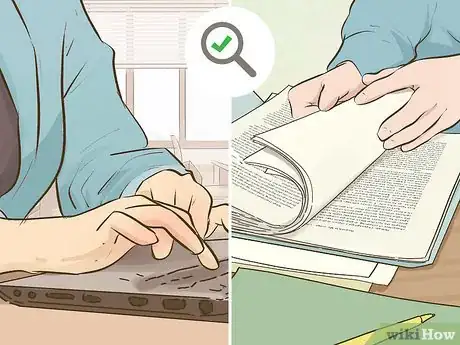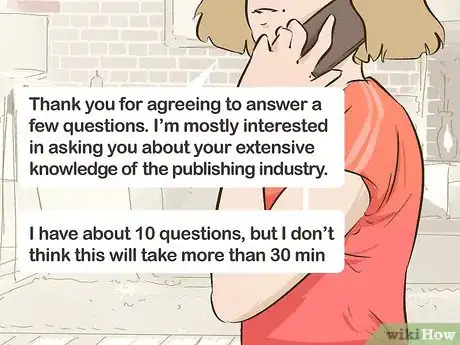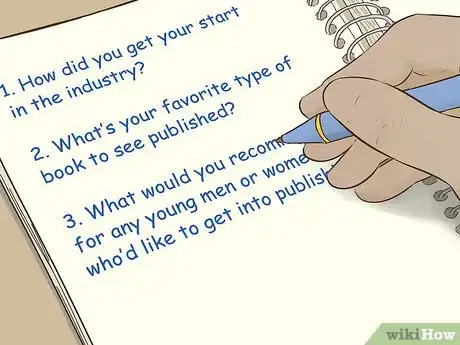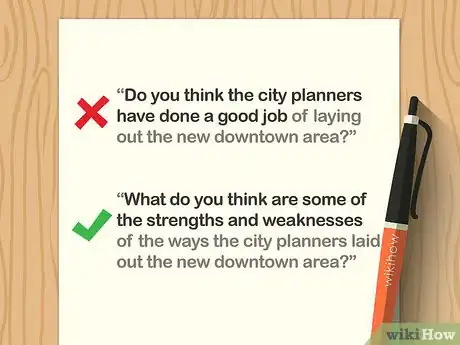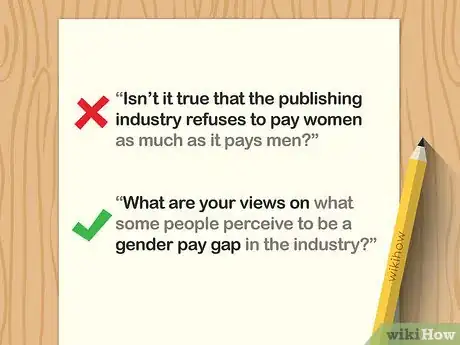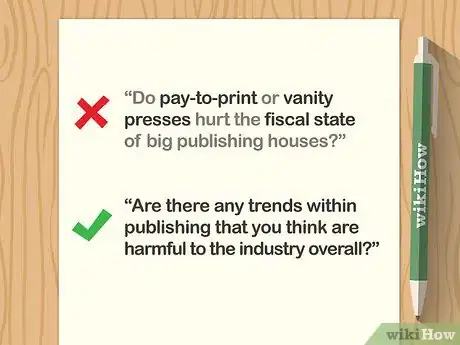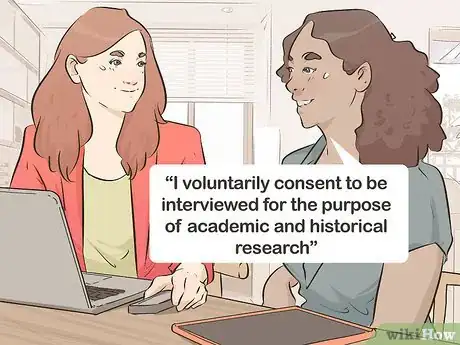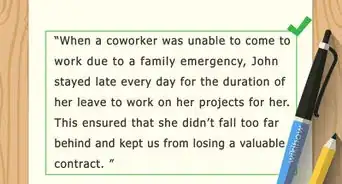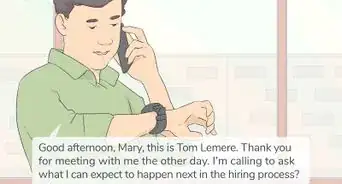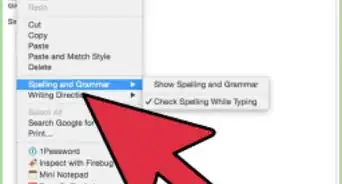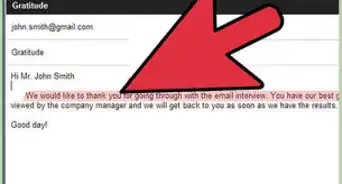This article was co-authored by wikiHow Staff. Our trained team of editors and researchers validate articles for accuracy and comprehensiveness. wikiHow's Content Management Team carefully monitors the work from our editorial staff to ensure that each article is backed by trusted research and meets our high quality standards.
There are 8 references cited in this article, which can be found at the bottom of the page.
This article has been viewed 26,535 times.
Learn more...
If you’re putting together a news report, a documentary film, or gathering oral history for any kind of personal project, you’ll likely need to perform 1 or more research interviews to gather the information you need. While these interviews can be relatively informal (unless they’re being broadcast live), you’ll need to make a few preparations beforehand, including having a written list of questions to ask. Let the interviewee answer the questions as they see fit, and guide the interview so that all of your questions are adequately answered.
Steps
Laying Groundwork for an Interview
-
1Research the interview topic to prepare yourself before the interview. If you’re interviewing someone in a field you’re not already familiar with, take 2 or 3 days before the interview to learn about the field. If you walk into the interview without a firm grasp of the basic facts you’ll be asking about, your ignorance will come across to the interviewee and the interview won’t produce much interesting information.[1]
- For example, if you’re interviewing a local biologist about declining frog populations, read up on what types of frogs and frog predators inhabit the area, and find out how much of the frog population has died off.
-
2Explain the purpose of the interview at least a week beforehand. Clarifying the interview’s purpose to the interviewee will help the person you’re interviewing know what they can expect from the course of the interview and will allow them to feel at ease.[2] Mention roughly how many questions you have, what some of them will address, and approximately how long you think the interview will take.
- If you set up the interview over the phone or via email, say something like, “Thank you for agreeing to answer a few questions. I’m mostly interested in asking you about your extensive knowledge of the publishing industry. I have about 10 questions, but I don’t think this will take more than 30 minutes.”
Advertisement -
3Choose a setting where both you and the interviewee are comfortable. Meet to conduct the interview in a neutral space. Try to avoid a space with distractions, such as a room next to a busy highway. For example, schedule the interview for an empty conference room at a hotel or library, rather than asking the subject to come to your home.[3]
- If you’re conducting the interview over the phone, find a time when you and the interviewee are both free.
-
4Bring a video camera or voice recorder to record the interview. Most smartphones have apps that can record audio, so you may already have a suitable recording device in your pocket. If you’d prefer a higher-quality recording, use a video camera or another type of audio recorder. At the very least, bring a pen and paper with you to write down the subject’s answers.[4]
- Don’t tell yourself that you’ll remember the interview! If you don’t record the questions and answers, you’re likely to forget details.
Writing and Asking Effective Questions
-
1Write out 6–8 questions to ask during the interview. Plan to have your questions on a sheet of paper with you when you walk into the interview room. It’s fine if you spontaneously come up with a handful of follow-up questions over the course of the interview, but it’s important that the main questions are composed before you sit down with the subject.[5] For example, if you’re interviewing a publishing specialist, write questions like:
- “How did you get your start in the industry?”
- “What’s your favorite type of book to see published?”
- “What would you recommend for any young men or women who’d like to get into publishing?”
-
2Craft questions that will generate more than a yes or no answer. In order to elicit articulate, thorough responses from your interviewee, give them open-ended questions that allow them to elaborate and provide their thoughts on the issue. Avoid asking simple questions that can be answered with a single word. Good introductory phrases for open-ended questions include “What do you think …” “Say more about …” or “What would you suggest … .”[6]
- For example, if you ask something like, “Do you think the city planners have done a good job of laying out the new downtown area?” the subject can just answer “yes” or “no.”
- Instead, ask, “What do you think are some of the strengths and weaknesses of the ways the city planners laid out the new downtown area?”
-
3Structure your questions objectively and without bias. If the questions that you’re asking become too subjective, or if you try to lead the interviewee to give a specific answer, the interview will lose some of its objectivity. Regardless of any personal feelings on the subject of your question, word your question so that the interviewee can express their personal stance without feeling lead or antagonized.[7]
- For example, avoid a question like, “Isn’t it true that the publishing industry refuses to pay women as much as it pays men?”
- Try asking instead: “What are your views on what some people perceive to be a gender pay gap in the industry?”
-
4Ask questions that are clear, generous, and jargon-free. Unless you’re planning to conduct a very aggressive interview (which isn’t recommended), start out with questions that are broad in scope, and get more specific as the interview progresses. Avoid using industry-specific jargon (especially if the interviewee isn’t familiar with the terms). Finally, word your questions as clearly as possible to avoid miscommunicating.[8]
- For example, avoid asking, “Do pay-to-print or vanity presses hurt the fiscal state of big publishing houses?”
- Instead, ask something like, “Are there any trends within publishing that you think are harmful to the industry overall?”
Behaving During the Interview
-
1Obtain verbal or written permission to conduct the interview. It's crucial that you get each subject’s verbal consent to being recorded before you begin the interview. Without this consent, the interviewee could allege that you recorded them illegally. Turn on the recorder or video camera, and ask the interviewee to say something like, "I voluntarily consent to be interviewed for the purpose of academic and historical research."[9]
- If you'd rather not ask immediately before the interview, ask the interviewee to fill out a consent form a week before the interview takes place. If the subject refuses to give their consent, you'll be unable to legally do the interview.
- For a sample consent form, look online at: https://managementhelp.org/businessresearch/consent-form.htm.
-
2Guide the interview along the sequence of questions you’ve planned. Bear in mind that you’re in charge of the pace and direction of the interview. If the conversation is moving too slowly, or if you’re ready to move on to, don’t hesitate to bring up the next question. The pacing of the interview is especially important when conducting research, since in some settings, you’ll need to interview multiple individuals in a small amount of time.[10]
- If the interviewee lingers too long on a specific question, try moving things along. Say something like, “I appreciate your insights. I’d like to turn to a different topic at this point: what’s the best college major for a career in publishing?”
-
3Listen attentively and maintain composure as the interviewee speaks. Show that you’re engaged with and interested in what the interviewee is saying by maintaining good eye contact and reacting verbally to their major points. That said, avoid looking surprised or giving away a personal bias. This kind of behavior could influence the interviewee to change their response, diminishing the objectivity of the interview.[11]
- For example, even if the interviewee says something surprising like: “I think it’s good that the frogs are dying!” avoid jumping up or shouting “What!?”
-
4Display sensitivity and sympathy with the interviewee’s answers. During the course of an interview, sensitive or serious topics may arise, or the subject may say things that are meaningful to them. In these instances, show sensitivity and sympathy in your facial expression and body language. Smile and nod to show your interest in what the interviewee says, or shake your head and frown if they bring up an unpleasant statistic.[12]
- For example, say that the interviewee says, “I became interested in city planning after a friend was killed in a poorly-designed intersection.” It would be inappropriate to say, “So what?” or “That sucks.” Instead, say something like, “I’m sorry to hear that; it’s a real tragedy.”
-
5Jot down any final notes after the interview has concluded. Take 5 minutes after the interview to gather your thoughts and make any follow-up notes to the information discussed in the interview. Write a note if, for example, the interviewee used any strange body language that could convey discomfort. Or, make a few notes towards an introductory paragraph you’ll write for the interview.[13]
- This would also be a good time to scroll through the audio or video file that you recorded and make sure that it’s all clear and audible.
References
- ↑ https://www.csus.edu/indiv/o/obriene/art116/readings/guide%20for%20conducting%20interviews.pdf
- ↑ https://youtu.be/9t-_hYjAKww?t=48
- ↑ https://managementhelp.org/businessresearch/interviews.htm
- ↑ https://www.csus.edu/indiv/o/obriene/art116/readings/guide%20for%20conducting%20interviews.pdf
- ↑ https://www.csus.edu/indiv/o/obriene/art116/readings/guide%20for%20conducting%20interviews.pdf
- ↑ https://www.csus.edu/indiv/o/obriene/art116/readings/guide%20for%20conducting%20interviews.pdf
- ↑ https://www.csus.edu/indiv/o/obriene/art116/readings/guide%20for%20conducting%20interviews.pdf
- ↑ https://youtu.be/9t-_hYjAKww?t=70
- ↑ https://managementhelp.org/businessresearch/interviews.htm
